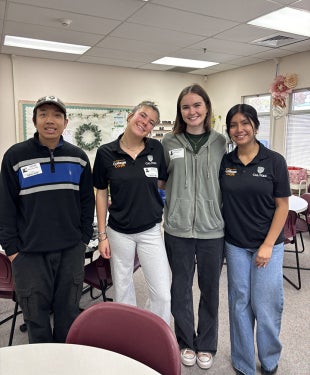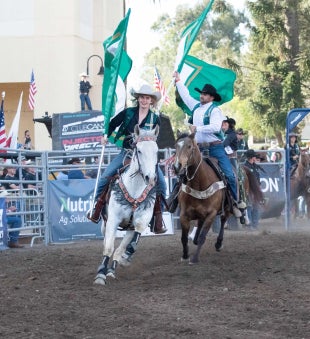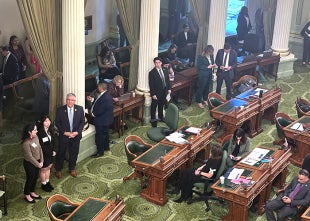Charles and Claire Jacobson Animal Health Center Groundbreaking Ceremony Commemorates Key Donors to the Project
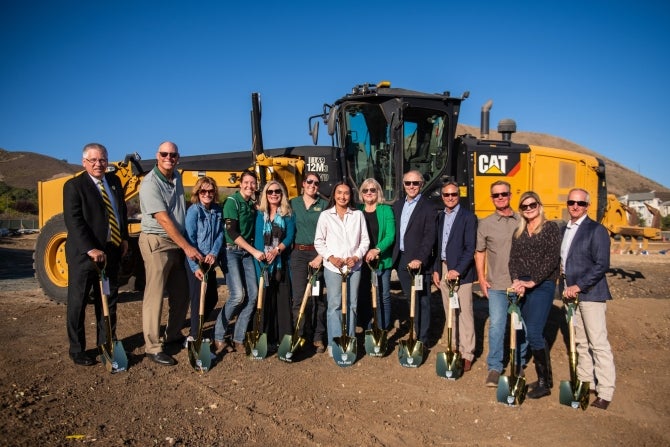
Contact: AnnMarie Cornejo
805-756-2427; ancornej@calpoly.edu
SAN LUIS OBISPO — The Cal Poly College of Agriculture, Food and Environmental Sciences held a groundbreaking celebration on Nov. 8 to celebrate the construction of the Charles and Claire Jacobson Animal Health Center, which broke ground this fall.
Plans for the new center include 15,500 square feet of multi-use space flexible for teaching, research and clinical training — including wet labs, a surgery suite and a necropsy area. The center is set to become an interactive, experiential animal facility that embraces hands-on learning, supporting the next generation of leaders in veterinary medicine, animal healthcare and animal agriculture.
“The Charles and Claire Jacobson Animal Health Center is more than a new building,” said Interim Dean Bill Hendricks. “It represents everything that Cal Poly and the College of Agriculture, Food and Environmental Sciences stands for: hands-on, interdisciplinary learning that prepares our students to address the current and future needs of the industry.”
The College of Agriculture, Food and Environmental Sciences offers one of the largest animal sciences programs in the country, with 75% of students entering with a desire to become a veterinarian – and serves as a much-needed pipeline for students who seek to enter a career in large animal veterinary care.
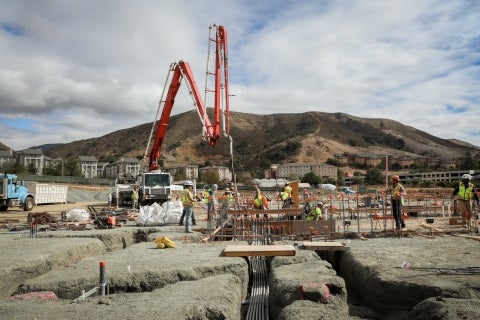
The center, located off of Via Carta Road, will be walking distance to the Oppenheimer Family Equine Center and horse paddocks. New student housing designated for students who work in the college’s 15 student-run production facilities was recently built adjacent to the center.
The building, designed by Gensler, a global architecture, design and planning firm and constructed by Hensel Phelps, will reinforce teaching, research and clinical training for animal science students in a modern, state-of-the-art facility that will meet the growing demand for animal health and science professionals.
The building, expected to be complete in winter 2026, is completely donor funded. Charles (Animal Husbandry, ’54) and Claire Jacobson were generous supporters and passionate advocates of student achievement. Their donation to the Animal Health Center reinforced their belief in the power of a hands-on, Learn by Doing education and the next generation of professionals in animal health.
Other key donors to the project include the Shaw Family, Tracy and Paul Pezzini, Tim and Alex Eastman, Dave Fly and Bonnie Snyder-Fly and Hunt and Debra Turner.
Naming opportunities in teaching, research and clinical training areas for gifts ranging from $50,000 to $5,000,000 are still available. For more information about the project, please contact Director of Development Abigail McCullough at ammccull@calpoly.edu.
About Cal Poly’s College of Agriculture, Food and Environmental Sciences
Cal Poly is a nationally ranked, comprehensive polytechnic university. The university’s College of Agriculture, Food and Environmental Sciences is comprised of expert faculty members who take pride in their ability to transform academically motivated students into innovative professionals ready to solve the complex challenges associated with feeding the world in sustainable ways. Students have access to state-of-the-art laboratories, including organic and conventional crop land, orchards, vineyards, forests, and rangeland, all of which provide the basis for Cal Poly’s Learn by Doing methodology. It is the fifth-largest college of agriculture in the country with more than 4,100 undergraduate students. For more information visit CAFES.calpoly.edu.

